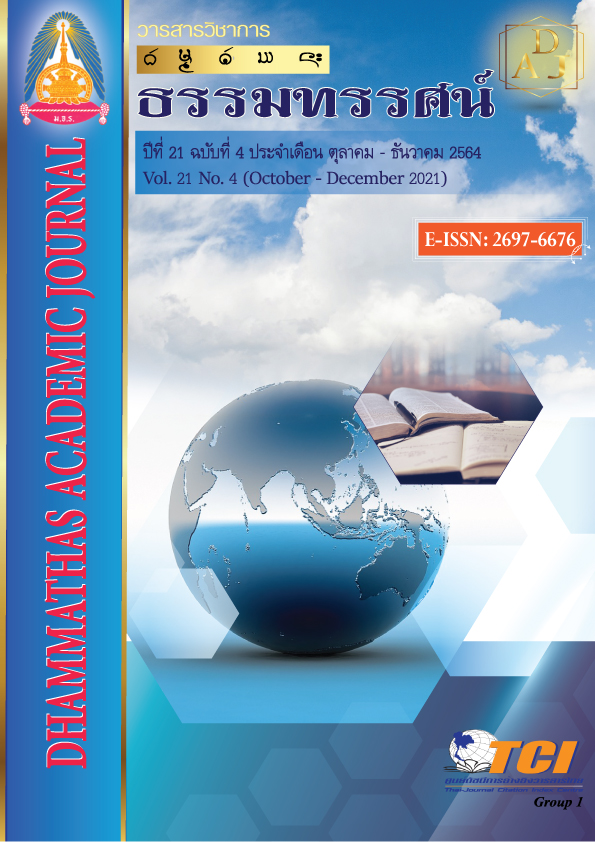The Buddhist Leadership of the Village Headman in Ban Pet Sub-district, Mueang district, Khon Kaen Province
Main Article Content
Abstract
The objectives of this research were: 1) to study leadership in Buddhist scriptures; 2) to study Buddhist leadership of village headmen in Ban Pet Sub-district, Muang District, Khon Kaen Province, 3) to analytically study the Buddhist leadership of village headmen in Ban Pet Sub-district in Ban Pet Sub-district, Mueang District, Khon Kaen Province. The study was carried out by means qualitative research. The data collection was conducted from studying documents and in-depth interviews. The obtained data were interpreted by descriptive analysis according to the inductive method with 25 informants/person.
The results of the research were as follows:
1. Leadership in Buddhist scriptures: principles and virtues in the administration of the role of the leader used as a guideline in performing administrative duties include six main principles of administration and morality that supports in a good way for leaders in promoting governance effectively.
2. Buddhist leadership of the headman in Ban Pet Sub-district, Mueang District, Khon Kaen Province can be divided into the following aspects: far-sighted vision with an annual village development plan; knowledge and ability used the knowledge to lead the villagers to develop the village; interpersonal relation, with easiness to get along with people; patience with attention, and not escape from work; alerting and diligence;
friendliness, love for colleagues, kindness.
3. The analysis of the Buddhist leadership of the village headman in Ban Pet Sub-district: when the headman has a Buddhist leadership, morality and ethics, good behavior by bringing the principles in Buddhism to be used as a guideline for being a leader in organizing various merit-making activities in line with the way of life of the community. These things can happen probably because in this district of Ban Pet, most of the villagers practice Buddhism and still respects Buddhism since ancient times. This is the highlight of the headman. However, weaknesses that should be corrected is the poor management of the headman, caused by not being able to work fully, irresponsibility or relying only on an assistant at work. These things can happen because the headman has a low salary not enough for expenses. They must do additional occupations causing corruption problems.
Article Details
References
กระทรวงมหาดไทย กรมการปกครอง. (2536). กํานัน ผู้ใหญ่บ้าน. กรุงเทพฯ: ส่วนท้องถิ่น.
จำนงค์ อดิวัฒนสิทธิ์. (2544). สังคมวิทยาตามแนวพุทธศาสตร์. กรุงเทพฯ: มหาจุฬาลงกรณราชวิทยาลัย.
พระธรรมปิฏก (ป.อ. ปยุตฺโต). (2540). ภาวะผู้นำ. กรุงเทพฯ: ธรรมสภา.
พระบุญเรือง ตธมฺโม (สุทธิชัย). (2544). การศึกษาเชิงวิเคราะห์ผู้นําในพระพุทธศาสนา: ศึกษาเฉพาะวิธีการแก้ปัญหาของพระพุทธเจ้า. (วิทยานิพนธ์พุทธศาสตรมหาบัณฑิต). พระนครศรีอยุธยา: มหาวิทยาลัยมหาจุฬาลงกรณราชวิทยาลัย.
พระมหาภชล โฆสิตเมธี (โฆสิตเมธางกูร). (2550). จริยธรรมสําหรับผู้นําตามหลักพระพุทธศาสนา. (วิทยานิพนธ์ศาสนศาสตรมหาบัณฑิต). นครปฐม: มหาวิทยาลัยมหามกุฏราชวิทยาลัย.
พระมหารุ่งโรจน์ ธมุมฏฐเมธี (ศิริพันธ์). (2551). การศึกษาวิเคราะห์หลักภาวะผู้นําในพระพุทธ ศาสนาเถรวาท. (วิทยานิพนธ์พุทธศาสตรมหาบัณฑิต). พระนครศรีอยุธยา: มหาวิทยาลัยมหาจุฬาลงกรณราชวิทยาลัย.
พระศรีศาสนาวงศ์. (2553). ผู้นำไทย ผู้นำธรรม ผู้นำเชิงพุทธ. กรุงเทพฯ: ประยูรสาส์นไทย.
พระอภิรัตน์ ฐิตวิริโย (ดาประโคน). (2560). ศึกษาแนวทางการพัฒนาภาวะผู้นําเชิงพุทธของผู้บริหารโรงเรียนมัธยมศึกษา อําเภอบางปะอิน จังหวัดพระนครศรีอยุธยา. (วิทยานิพนธ์พุทธศาสตรมหาบัณฑิต). พระนครศรีอยุธยา: มหาวิทยาลัยมหาจุฬาลงกรณราชวิทยาลัย.
มหาวิทยาลัยมหาจุฬาลงกรณราชวิทยาลัย. (2539). พระไตรปิฎกฉบับภาษาไทย ฉบับมหาจุฬาลงกรณราชวิทยาลัย. กรุงเทพฯ: มหาจุฬาลงกรณราชวิทยาลัย.
โสภิตา จิวะพงศ์. (2553). บทบาทวัดในการส่งเสริมสุขภาพชุมชน: กรณีศึกษา วัดพระธาตุดอยสะเก็ด จังหวัดเชียงใหม่. (วิทยานิพนธ์พุทธศาสตรมหาบัณฑิต). พระนครศรีอยุธยา: มหาวิทยาลัยมหาจุฬาลงกรณราชวิทยาลัย.

